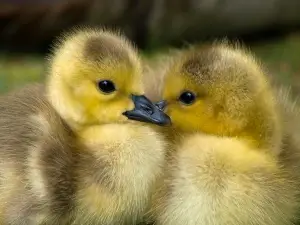
If you’re raising baby birds you’re more than likely keeping a very watchful eye over them to make sure that they are healthy and growing well.
Birds have evolved not to show distress when they’re suffering, so, even subtle changes in the bird’s behavior can indicate that something is wrong.
Your baby bird may be clicking while breathing, so, why does this happen? This article looks into it
A variety of ailments can cause your bird to start clicking while breathing, this can be caused by aspiration pneumonia, pneumonia caused by worms, or hemorrhaging as a result of Teflon fumes.
Table of Contents
Baby bird clicking when breathing
Baby birds can suffer from respiratory distress, respiratory distress can be caused by a number of things including:
Aspiration pneumonia:
Aspiration pneumonia can develop in baby birds if the animal aspirates food into its lungs as you feed them.
Feeding baby birds can be difficult, and aspiration can easily happen because the anatomy of a baby bird’s mouth is different than that of a human’s mouth.
Aspiration pneumonia can not only develop if the bird aspirates while feeding, it can also happen if the bird inhales vomit or liquid into its lungs.
What to do:
Aspiration pneumonia is a very serious condition, it is not something that you can treat at home with much success, taking the bird to a vet is recommended. Your vet will run a full exam to diagnose the bird and then suggest treatment.
If you catch the illness early enough, your vet will give you antibiotics and/or antifungal medication to treat your bird with. You can treat the bird at home using these medications if instructed by your vet.
If the illness is caught later on, and is more advanced, your bird will have to be hospitalized.
Worms causing pneumonia:
This condition is more common in young birds like baby birds. A worm infection happens when a bird ingests a Syngamus trachea nematode (a type of roundworm), when it eats an earthworm.
The roundworms will migrate through the baby bird’s lungs and cause pneumonia. The worms can also travel to the bird’s trachea and bronchi.
Eventually, the worms in the respiratory system will cause hemorrhaging and the bird’s body will produce large amounts of mucus which will plug the trachea.
Signs of the trachea being plugged include clicking while breathing, gasping, asphyxiation, and eventually death
What to do:
If you can, take your bird to a vet as soon as possible.
Taking your bird to an avian vet is recommended over taking your bird to a general vet. An avian vet will likely notice issues with your baby bird quicker than your general vet will and/or the avian vet will notice things that your general vet will not.
Hemorrhaging from Teflon fumes:
Teflon fumes are not great, they aren’t great for humans or birds. Toxic gasses produced when heating Teflon are responsible for killing thousands of birds each year.
Smoke inhalation due to the burning of Teflon products is called Teflon toxicosis.
When products that are coated with Teflon are heated to above 570 degrees Fahrenheit, they release toxic gasses, 6 toxic gasses to be precise. These gasses have an effect on both humans and birds.
Birds have very sensitive lungs, they need clean fresh air. Toxic gasses, like the gasses produced when heating Teflon, can be particularly bad for them.
When these gasses are inhaled, they cause the bird’s lungs to hemorrhage blood and then fill with fluid. This leads to a variety of respiratory malfunctions and eventually death by suffocation.
What to do:
Prevention is better than cure, you need to avoid buying Teflon products altogether. You’d also need to replace the Teflon cookware you already have with cast iron or stainless steel cookware.
Unfortunately, using an air purifier to get rid of the Teflon fumes will not work.
It is said that using your Teflon cookware correctly, that is, using the product with food in it, and not actually letting the coating burn, will keep your birds safe. But it’s best to err on the side of caution and simply not use them. They are not good for your birds or humans
FAQ:
How do you know if your bird is having trouble breathing?
Your pet may make clicking sounds while breathing and they may show other signs of having trouble breathing, signs that indicate that your pet is having trouble breathing include sneezing, coughing, nasal discharge, open mouth breathing, increased or decreased nostril size, and wheezing.
How can I help my bird breathe?
The first thing that you’d need to do is make sure that the animal is in a well-ventilated area that is draft free, next, make sure to remove any strong smells or fumes that the bird may breathe in, also, allow the bird to be calm enough to breathe well by placing it in a dim, stress free area.
Conclusion:
In conclusion, if your bird is making clicking sounds while breathing then it is likely suffering from either aspiration pneumonia or pneumonia caused by worms. Heating Teflon products can also cause your bird to make clicking sounds when breathing.
If you enjoyed this article then you may also be interested in other baby bird related articles. Here are some articles that you may be interested in: Baby Bird Died Overnight?, Baby Bird Breathing Fast?, Baby Bird Opening And Closing Its Mouth?

